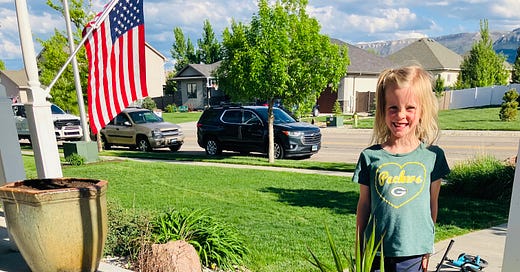Whit Monday Gardening
Pentecost joy, honest dirt on our hands, and a respectful disagreement with Miss Marple
Blessed Whit Monday! That’s old-fashioned-speak for the day after Pentecost, stemming from the Greek word for fifty. Of course, we Lutherans know Pentecost involves some serious fire—the fire of the Holy Spirit which God sent to Christ’s disciples fifty days after His resurrection.

I keep thinking of a sermon from a few weeks ago where my dear husband Jon, the pastor at Trinity here in Casper, preached about the “shy” Holy Spirit, in reference to the third Person of the Trinity bringing us Jesus. The Paraclete doesn’t shamelessly self-reference the way we do, but the Helper’s shyness doesn’t necessarily mean subtlety, though, or weakness. I love the contrast and the simultaneous beautiful unity between this holy shyness and this Pentacost “mighty rushing wind” bearing tongues of bright, unquenchable fire and all the varied languages of mankind, all proclaiming “the mighty works of God” (Acts 2:1-11). That’s the kind of shy I want to be, and I daresay I need to be—Christ first, always first, blazing and brilliant, mighty and awesome and the Answer, with a lingering whisper in the air the only hint of how He came. We are grateful for that wind, but we’d be fools to talk about the breeze instead of what it brought—life and salvation.
So here we are, on the day after Pentecost, assured of Christ’s presence with us because of that great fiery visit the Holy Spirit made and continues to make. Yesterday we witnessed a baptism of a fine baby boy. I was impressed all over again by how deeply God loves us—that He would’ve come down to our earthy earth and lived and died and rose again if this wee one was the only human creature in need of saving. We heard the Flood Prayer, which was especially poignant on the day we also heard Genesis 11, where Noah’s descendants proudly and idolatrously built a tower to heaven. And we all, in the congregation, renounced the devil, his works and ways, and confessed the truth about the Triune God. It was a comfort to us to hear the promises of Christ as much as it will be for this sweet boy as he grows up hearing God’s Word and promises. Depart, you unclean spirit! Ephphatha, be opened! You, dear child, belong to Christ!
I’ll be honest. I’d heard the term Whit Sunday for years, but it wasn’t until I was reading a short story collection of Agatha Christie’s beloved spinster sleuth, Miss Marple, that I did some serious digging into the meaning. Miss Marple, herself an avid and accomplished gardener, imperiously tells someone, “Gardeners don’t work on Whit Monday.” Was this like the green thumb mantra that one shouldn’t plant certain flowers or vegetables until after the American Mother’s Day? No, it was in reference to the Holy Spirit’s “White Sunday,” or Whitsun in the contraction form. And until about fifty years ago in England, Whitsuntide was a season directly tied to Pentecost and generally the coming of late spring and summer. Miss Marple, a pious Anglican, no doubt held fast to the irregularities of doing any sort of work on a holy day, as Whit Monday long was.
I sincerely wish all people would celebrate Christian holy days with the kind of fervent devotion we should. These are the days—Christmas, Easter, Ascension, Pentecost—that mean the most in our lives, because they point us directly to what Christ promises now and in the next. That life will last forever, which we usually forget (how temporal of us). But we often explain away our apathy, which often hides our latent antipathy. How else can we seriously prioritize, say, sleeping in over receiving Christ’s gifts?
From dust we were formed, and to dust we shall return, and this is where I respectfully disagree with Miss Marple. We should receive Christ’s gifts. And then we should bury our hands in thick, loamy soil, sticking seeds or burying bulbs or transplanting trees. remembering both the miracle of our creation and the reality of our redemption. God pours out, and we reap what He sows. Whit Monday is good for gardening.
Jon knows far more about growing things than I do, so he teaches me and I’m slowly learning. He planted two maple trees in our backyard this weekend, digging the holes specifically so the grafted portion of the tree root wasn’t covered (trees do better here with boxelder roots, we learned). He cut the roots and took handfuls of the fungal tree food, rubbing it all over the cuts and the outside of the crumbly base, sprinkling it in the hole, mixing the clay from the ground with organic soil, soaking it all with water, and then staking the trunks with bamboo poles (we live in the Windy City, after all). It was a beautiful process. Today we will transplant petunias and other annuals into our front porch pots, and I will weed the front beds of the tenacious greens that are invading the existing shrubbery.
Christ’s mercies to us are mysterious and yet no mystery, a both/and truth with which I daresay even Miss Marple would agree. The Holy Spirit comes shyly, and we speak boldly. He cleanses us, and our dirty hands make us thankful. We hope, and He hears. “And it shall come to pass that everyone who calls upon the name of the Lord shall be saved” (Acts 2:21).





